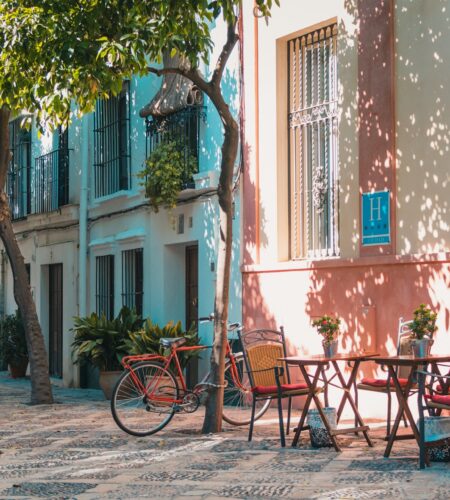Moving to a new country changes everything—your morning coffee tastes different, the commute follows unfamiliar streets, and even simple grocery shopping becomes an adventure.
After six months of building my expat routine in Barcelona, I’ve learned that creating a new normal isn’t about replicating what you left behind. It’s about discovering who you become when everything familiar falls away.
The first few weeks felt like living in someone else’s life. My old habits didn’t translate, my usual comforts weren’t available, and the simple act of ordering lunch required mental preparation.
But somewhere between figuring out the metro system and finding a decent cup of coffee, something shifted. I stopped trying to recreate my old life and started building a new one.
This transformation doesn’t happen overnight. It requires patience, flexibility, and a willingness to embrace the uncomfortable moments that come with starting fresh.
Here’s what my daily life abroad looks like now, and the lifestyle changes that helped me find my footing in a place that’s slowly becoming home.
Morning Rituals in a Foreign Land
Embracing Local Breakfast Culture
My mornings start differently now. Back home, I grabbed coffee on the go and ate breakfast at my desk. Here in Barcelona, breakfast is a more deliberate affair. I’ve adopted the Spanish tradition of café con leche and a small pastry.
I usually enjoyed standing at the local bakery counter while reading the morning news on my phone. This shift taught me something important about adaptation.
Sometimes the best way to integrate isn’t to find substitutes for what you miss, but to genuinely try what locals do. The slower morning pace initially frustrated my productivity-focused American mindset, but now it feels like a daily meditation—a quiet moment before the day begins.
Language Learning as Morning Fuel
I dedicate the first 30 minutes after breakfast to Spanish lessons using language apps. This isn’t just about communication—it’s become my daily dose of accomplishment. Each new phrase learned feels like unlocking another piece of my new city.
Some mornings, the grammar makes perfect sense; others leave me questioning why anyone thought three different past tenses were necessary.
The key breakthrough came when I stopped treating language learning like homework and started seeing it as my ticket to deeper connections.
Understanding the elderly woman at the fruit stand or catching jokes during casual conversations transforms you from observer to participant.
Navigating Work and Professional Identity
Remote Work Challenges
Working remotely while living abroad presents unique challenges that no one warns you about. Time zone coordination became my nemesis—scheduling calls with colleagues back home meant either very early mornings or late evenings.
I learned to block my calendar strategically, protecting the middle of my day for deep work when my energy peaks. The bigger challenge was maintaining professional relationships across distance.
Video calls capture conversation but miss the casual hallway interactions that build real connections. I started scheduling informal virtual coffee chats with colleagues, which helped preserve relationships that pure work meetings couldn’t sustain.
Finding Local Work Opportunities
Six months in, I began exploring local freelance opportunities. This wasn’t about replacing my remote income, but about building professional networks in my new country.
Working with Spanish clients improved my language skills faster than any app could and gave me insights into local business culture that tourist experiences never reveal.
The networking events felt awkward initially—introducing yourself in a second language while explaining your professional background requires mental gymnastics. But persistence paid off.
I now have several local clients and a growing network of expat and local professionals who’ve become both collaborators and friends.
Social Connections and Community Building
The Expat Community Reality
Popular expat blogs make community building sound effortless—just show up to meetups and instant friendships bloom.
Reality proved more complex. Yes, expat groups exist, but finding your tribe takes time and intentional effort. I attended various events before finding groups that matched my interests and energy levels.
The breakthrough came when I joined a local hiking group that mixed expats and Spanish locals. Shared activities create natural conversation opportunities, and physical movement somehow makes language barriers less intimidating.
These weekend adventures became the foundation of my social calendar and introduced me to hidden corners of Catalonia.
Maintaining Relationships Back Home
Staying connected with friends and family required recalibrating expectations. The eight-hour time difference meant spontaneous calls became impossible.
I established weekly check-ins with close friends and family, scheduling them like important meetings. Quality replaced quantity—our conversations became more intentional and meaningful.
Social media helped maintain lighter connections, but video calls preserved deeper relationships. Seeing familiar faces and hearing voices provided emotional anchoring during moments when homesickness hit unexpectedly.
Daily Logistics and Practical Adaptations
Shopping and Meal Planning
Grocery shopping abroad requires relearning basic tasks. Product names, measurement systems, and shopping customs all differ. I spent embarrassing minutes staring at cleaning supply labels, trying to identify dish soap versus floor cleaner through package design alone.
My approach evolved from translation apps to pattern recognition. I photographed products I needed, learned key vocabulary, and gradually built familiarity with local brands.
Shopping trips transformed from stressful missions to pleasant neighborhood walks where I discovered new products and occasionally helped other confused foreigners navigate the aisles.
Transportation and Getting Around
Mastering public transportation became a point of pride. The Barcelona metro system initially seemed like an underground maze, but systematic exploration revealed its logic.
I downloaded offline maps, studied route patterns during low-pressure weekend trips, and gradually built confidence navigating across the city.
Walking became my preferred transportation for nearby destinations. This wasn’t just about saving money—street-level exploration reveals neighborhood character that underground travel misses.
I discovered favorite cafés, noticed seasonal changes in local parks, and developed an intuitive sense of direction that GPS couldn’t provide.
Health and Wellness Adaptations
Finding Healthcare Providers
Navigating healthcare in a new country ranks among expat life’s most stressful challenges. I researched the Spanish system, registered with local authorities, and identified English-speaking healthcare providers before emergencies arose.
Having a plan reduced anxiety and made routine medical needs manageable. I also established relationships with a local pharmacy and learned basic medical vocabulary in Spanish.
Pharmacists here provide more guidance than their American counterparts, often recommending over-the-counter solutions for minor issues that would require doctor visits back home.
Exercise and Fitness Routines
My fitness routine required complete reconstruction. The gym I loved back home had no equivalent here, and different equipment availability meant adapting workout preferences.
I discovered local fitness classes, joined a neighborhood running group, and incorporated more walking into daily activities.
The Mediterranean lifestyle naturally promotes different wellness approaches. Late dinners, afternoon siestas, and prioritizing social connections over productivity created a more balanced rhythm than my previous high-stress American schedule.
Financial Management and Budgeting
Cost of Living Adjustments
Understanding local costs took several months of trial and expensive errors. Restaurant prices, utility costs, and entertainment expenses followed different patterns in my home country.
I tracked spending carefully during the first few months, identifying areas where money went further and others where budgets needed adjustment.
Banking presented its learning curve. Different fee structures, payment methods, and currency conversion considerations required research and adaptation.
I opened a local account, learned about international transfer options, and established financial systems that worked across both countries.
Building Emergency Funds
Financial security feels more important when you’re far from familiar support systems. I established larger emergency funds than I maintained back home, accounting for potential travel costs, visa requirements, or unexpected expenses that come with international living.
What Tomorrow Brings
Living as an expat taught me that adaptation isn’t about perfection—it’s about progress. Some days flow smoothly, with conversations in Spanish feeling natural and navigation happening without second thoughts.
Other days, simple tasks feel overwhelming, and homesickness strikes without warning. The lifestyle changes that seemed impossible six months ago now feel like natural parts of my day.
My morning coffee ritual grounds me, work calls across time zones feel manageable, and weekend adventures continue expanding my understanding of this place I’m learning to call home.
Building a life abroad requires patience with yourself and openness to experiences that don’t match your expectations.
The person I’m becoming here incorporates pieces of who I was before while adding new dimensions I couldn’t have imagined from my old living room. Your expat journey will look different than mine.
The country, circumstances, and challenges will vary, but the fundamental process remains consistent: embracing uncertainty, finding small daily victories, and gradually building a life that feels authentically yours, even when it’s nothing like what you left behind.
Subscribe to our email newsletter to get the latest posts delivered right to your email.

